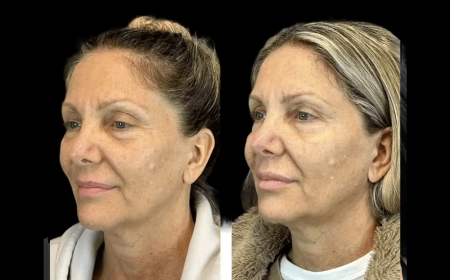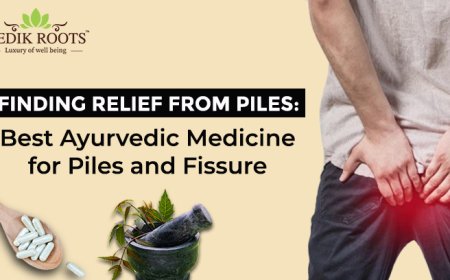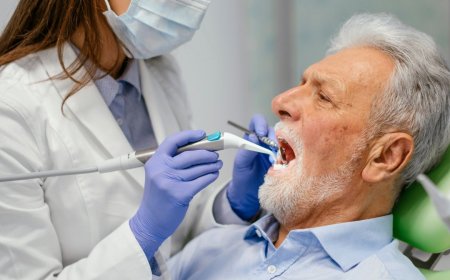How Teeth Whitening Affects Your Enamel and Oral Health
If you’re considering whitening, take the time to research clinics by searching teeth whitening near me, and make sure to factor in the teeth whitening cost versus the long-term health of your teeth. Ultimately, a healthy, confident smile is about more than just colour—it's about maintaining strong, protected enamel and overall oral wellbeing.

A bright, white smile is often associated with good health and confidence. With the increasing popularity of cosmetic dentistry, teeth whitening has become one of the most sought-after treatments across Australia. While the desire for whiter teeth is understandable, it's essential to understand how this procedure affects your enamel and overall oral health. In this article, well explore the impact of teeth whitening on your dental enamel, the potential risks, the safety of different methods, and what to consider when searching for teeth whitening near me or evaluating the teeth whitening cost involved.
What is Teeth Whitening?
Teeth whitening is a cosmetic dental procedure that lightens the colour of your teeth using bleaching agents such as hydrogen peroxide or carbamide peroxide. These chemicals break down stains into smaller molecules, making the teeth appear brighter and whiter.
Teeth discolouration can occur due to various reasons including coffee, tea, red wine, smoking, ageing, or certain medications. Whitening treatments aim to reverse this staining, but the way they interact with your teethparticularly the enameldeserves careful attention.
Understanding Tooth Enamel
Tooth enamel is the hard, protective outer layer of the tooth. It shields the inner layers from decay and damage. Unlike other parts of your body, enamel cannot regenerate once it's eroded. That makes it vital to protect your enamel during any cosmetic treatment.
How Whitening Affects Enamel
Many people worry that teeth whitening might damage their enamel. The good news is that, when done professionally and in moderation, whitening does not significantly weaken enamel. However, overuse or using improper products can cause problems.
Here are some key effects of whitening on enamel:
1. Temporary Sensitivity
One of the most common side effects is increased tooth sensitivity. This happens because the bleaching agents can penetrate the enamel and irritate the nerves inside the tooth. Sensitivity usually resolves within a few days after treatment.
2. Enamel Dehydration
Teeth may become temporarily dehydrated after whitening. This can make the enamel appear slightly chalky or give a translucent look. However, this is generally a short-term effect and the enamel rehydrates naturally over time.
3. Surface Roughness
Some over-the-counter whitening products or unregulated kits may alter the surface texture of enamel, making it rougher. This can potentially make teeth more susceptible to plaque build-up and staining. Always use products approved by the Therapeutic Goods Administration (TGA) or consult with your dentist.
4. Erosion Risk with Overuse
Excessive or frequent whitening treatments, especially when done without professional supervision, can increase the risk of enamel erosion. This is why it's crucial to follow guidelines and avoid over-whitening.
Professional vs. DIY Whitening
When considering teeth whitening, the method you choose can significantly impact your enamel and oral health.
Professional Whitening
Dentist-supervised whitening is considered the safest and most effective method. Dentists use high-quality products and tailor the concentration and duration based on your individual needs. They also ensure your gums and soft tissues are protected during the process.
Professional treatments may be in-chair, where results are often immediate, or take-home kits with custom trays. While the teeth whitening cost at a dental clinic may be higher compared to over-the-counter options, the results are more predictable, and risks are minimised.
Over-the-Counter Products
Supermarket or pharmacy whitening products, such as strips, gels, and trays, are more affordable and accessible. However, they often have lower concentrations of whitening agents and can be misused. Incorrect usage may lead to uneven whitening, enamel irritation, or gum burns.
If you're tempted by a DIY solution, always read the instructions carefully and consult with your dentist before beginning.
Choosing the Right Treatment
When searching online for teeth whitening near me, consider these factors to ensure you're choosing a safe and effective provider:
- Qualifications: Choose a registered dental professional.
- Reputation: Read reviews and testimonials.
- Consultation: A good clinic will offer a consultation to determine the best treatment.
- Customisation: Treatments should be tailored to your dental history and sensitivity levels.
- Aftercare Advice: Post-whitening guidance is crucial for maintaining results and protecting enamel.
Also, ask upfront about the teeth whitening cost, which can vary depending on the type of treatment, the clinic's location, and the technology used. In Australia, professional in-chair whitening usually ranges between $300 and $800.
Maintaining a White Smile Without Harming Enamel
After whitening, it's important to adopt habits that help maintain your smile without compromising enamel:
- Avoid staining foods and drinks like coffee, tea, and red wine for at least 48 hours post-treatment.
- Brush with a soft-bristled toothbrush and non-abrasive fluoride toothpaste.
- Use a straw when drinking coloured beverages to reduce contact with teeth.
- Maintain regular dental check-ups and cleanings.
- Avoid smoking, which is a major cause of staining.
In summary, teeth whitening can be a safe and effective way to brighten your smile, provided it's done correctly and in moderation. While professional treatments minimise risks to enamel, improper or excessive whitening can lead to sensitivity and enamel damage. If youre considering whitening, take the time to research clinics by searching teeth whitening near me, and make sure to factor in the teeth whitening cost versus the long-term health of your teeth. Ultimately, a healthy, confident smile is about more than just colourit's about maintaining strong, protected enamel and overall oral wellbeing.








































